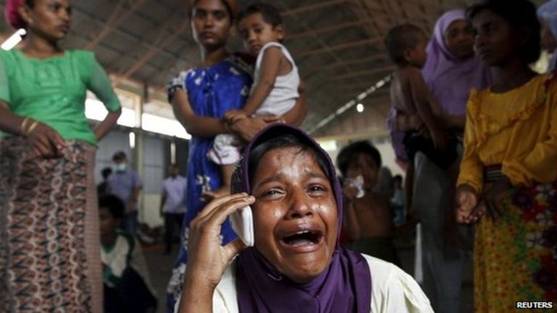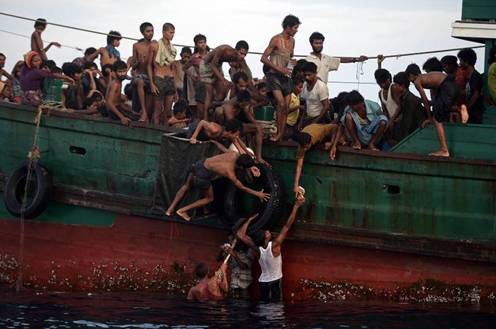Hungry Thirsty Thousands of Migrants Drifting on Sea in
Violent Clashes Over Food Kill Dozens
By Countercurrents
18 May, 2015
Countercurrents.org

A Reuters photo shows desperate condition of the migrants: Nearly 800 migrants were rescued on Friday after their boat capsized off Indonesian waters Photo: Reuters
Thousands of migrants hungry and thirsty for days are drifting on south-east Asian sea as countries in the region are pushing them back. There are children and women among the thousands in small boats. Deaths are normal in the desperate condition. In at least one incident, dozens were killed in violent clashes over food among the persons in a drifting boat.
They are from
The UN refugee agency has reported a surge in departures from
Activists say 8,000 people may be adrift on overcrowded vessels, with starvation and disease claiming lives, after a Thai crackdown crimped busy routes and spurred people-smugglers to abandon men, women and children at sea.
A News Mail report said on May 17, 2015:
An estimated 8000 people are stuck in the

An AFP-JIJI photo shows Rohingya migrants pass food supplies dropped by a Thai army helicopter to others aboard a boat drifting in Thai waters off the southern
An AFP-JIJI report published in The Japan Times said:
The report datelined off
On Thursday, a boat crammed with scores of Rohingya was found drifting in Thai waters.
As dusk fell several visibly emaciated men jumped into the sea to retrieve food packages dropped by a Thai navy helicopter.
An AFP reporter saw one of the men eat handfuls of raw instant noodles in the water before swimming back to the boat.
“About 10 people died during the journey. We threw their bodies into the water,” one of the migrants shouted in Rohingya to a boat full of journalists.
“We have been at sea for two months. We want to go to
Many young children were among the weak-looking passengers on the wooden boat, which was found near the southern Thai
A BBC report on early-May 17, 2015 said:
Survivors have described desperate conditions on the boats, with people thrown overboard amid fights for food.
The BBC's Jonah Fisher in
The crackdown on boat people landing in Thailand and Malaysia means the smugglers are reluctant to make the journey but BBC correspondent says they are refusing to release those on board unless ransoms are paid.
However, Zaw Htay, director of
"We are not ignoring the migrant problem, but... we will not accept the allegations by some that
"The problem of the migrant graves is not a
Close to 800 migrants were rescued after their boat sank on Friday near Langsa in
The boat had reportedly been at sea for two months and was recently deserted by its crew.
The Rohingya and Bangladeshi migrants on board began fighting over dwindling food supplies, survivors said.
"They were killing each other, throwing people overboard," Langsa police chief Sunarya told AFP.
Rohingya Muslims attempt to flee
Instead they are reported to have been abandoned at sea. The numbers involved are unclear but rights group say thousands are thought to be stranded.
Human ping-pong
Jonathan Head, BBC News, southern
“It is being called human ping-pong - the refusal of south-east Asian countries to accept mainly Rohingya migrants from
“So the boat we found on Thursday, which had already been pushed back once from
“On board, more or less running the boat, are Rohingya brokers, who have good reason not to want to land in
“Thai officers are negotiating with these men, who claim to speak for all 350 on board. So the Thais say they were merely helping by repairing the engine and sending the boat on its way.
“But what about the women and children on board - more than half the passengers? What about all the visibly ill people, or those who look half-starved? How can an endless sea voyage in an appallingly cramped and unsanitary boat help them? Thai and Malaysian officials are not saying.”
An AFP report headlined “
Malaysia's prime minister Najib Razak said on Saturday he would seek help from Myanmar to address the unfolding "humanitarian catastrophe" involving a wave of people fleeing on boats to Southeast Asia, thousands of whom are ethnic Rohingya escaping oppression in the mainly Buddhist country.
The report by Nurdin Hasan said:
'Throwing people overboard'
In one of the grimmest episodes yet, survivors of a boat that sank off the east coast of Sumatra island -- among roughly 900 people rescued off
"They were killing each other, throwing people overboard," said Sunarya, police chief of the city of
The packed boat had set off two months ago but was deserted this week by captain and crew, survivors said.
It was then turned away, first by
"When we asked for food, they beat us. The Bangladeshis were very weak, so we could not fight back," he said.
Another survivor, Absaruddin, gave harrowing details of being kidnapped in the Bangladeshi town of
A group of men pounced on the 14-year-old and three of his teenage friends while they were having breakfast.
"They beat us, tied us up and took us onto the ship," he told AFP, after he was rescued of Aceh.
"Before we could do anything we were at sea with hundreds of Bangladeshis and Rohingya."
Nearly 600 migrants were already sheltering in Sumatra's Aceh province after managing to get ashore in recent days, while more than 1,100 had reached
“Fixing and refueling”
About 100 made it to a southern Thai island late Thursday, while a boat found by journalists in waters further south earlier that day drifted between
Thai Navy Lieutenant Commander Weerapong Nakprasit told reporters
"We are not pushing them out, we are helping them," he said, echoing earlier official comments that the migrants did not want to enter the kingdom amid calls by rights groups to allow desperate passengers to disembark.
He added that the navy later "escorted" the vessel westwards towards international waters.
The appalling scenes have triggered global calls, including by UN chief Ban Ki-moon and Washington, for
Big money trade in humans
Another AFP report headlined “Of smugglers and kingpins:
“Around $1,100 should have secured passage for each of the Rohingya migrants who were found adrift in the
“From the heaving bow of a wooden boat packed with emaciated and bedraggled fellow Rohingya, Mohammad Salim, 30, said his brother had the 4,000 Malaysian ringgit ($1,120) demanded by the brokers -- if he made it.
“‘I haven't paid anything yet... we just want to get to
The report by Preeti Jha said:
“As ruthless trafficking networks have splintered, the desperate migrants have been left weak and starving on board the boat, which AFP found several kilometers (miles) off the southern Thai
“Provided with food and water, and its engine fixed, the boat left Thai waters early Friday, in line with the kingdom's policy of stopping the migrants from settling in
“The pay-on-arrival deal described by Salim is favored by some smuggling networks which start in western
“They reach hundreds of kilometers down to the Thai south and beyond.
“In recent months, the gangs appear to have adjusted their tactics to offer cheap, or even free, sea transit south.
“Rights groups say the real money is made in southern
“A boatload of 400 people -- recruited, duped or even kidnapped -- could be worth up to $800,000, according to anti-trafficking group Freeland Foundation, which has helped Thai police investigate the illicit industry.
“Salim and his fellow passengers could not have known when they set out from
“The belated crackdown, which has seen more than 60 arrest warrants issued and a similar number of police transferred, was sparked by the May 1 discovery of mass graves on a forested hillside straddling the Malaysian border.
“The move appears to have set off a chain reaction and traffickers have fled, abandoning migrants by the hundreds at sea or in jungle camps.
“As the remains of migrants were dug out from shallow graves in the full glare of the media, Thai police came under intense pressure to act.
“Thai officials have long been accused of turning a blind eye to human trafficking and even taking a cut from the lucrative trade.
“An influential former Satun province official, Pajjuban Aungkachotephan -- better known as Ko Tong or 'Big Brother Tong' -- has fallen under suspicion.
“Police are investigating whether Ko Tong ran a major smuggling route through a private island off Satun, onto the Thai mainland where the mass graves were found, and then into
“‘Every big business has to go through his ears and eyes,' one businessman in Satun told AFP, requesting anonymity.
“‘I don't know if he was involved or not (in trafficking) but if anyone was doing something illegal, he would know,' he added.”
The report said:
“National police chief Somyot Poompanmoung on Friday said Ko Tong, who is on the run, had contacted police with an offer to surrender as long as he received bail -- a demand rejected as ‘unacceptable'.
“Trafficking experts say
“‘Most traffickers from
“But the sums involved -- which Smith puts at $250 million since 2012 -- means ‘layers of people' have got rich, with ample cash left over to grease palms where needed.
“The money trail reaches back to the poor departure countries.”
The report added:
“On May 8, in Bangladesh's Cox's Bazaar region, where around 300,000 Rohingya refugees eke out a life alongside a huge number of poor Bangladeshis, three alleged people-smugglers were killed in a gunfight with police.
“Among them was 55-year-old Dholu Hossain, who police believe to be responsible for smuggling more than 1,000 Bangladeshis on trawlers headed south for 20,000 Bangladeshi taka ($255) each.
“Sixteen brokers have also been detained since the Thai crackdown, according to Tofail Ahmed, a senior police official in Cox's Bazaar.
“‘These brokers were previously boatmen and fishermen. But the ever-booming business of illegal migration turned them into human traffickers,' he told AFP.
“It is a recruitment process facilitated by a threadbare rule of law, desperation, poverty and greed -- and it also sees some Rohingya brokers prey on the misery of their own people.
“‘Many Rohingyas got involved with the business,' said Anwar Hossain, 25, who lives in the Kutupalong refugee camp in Cox's Bazaar.
Manu's story
The News Mail report headlined “8000 lives currently endangered in Asian boat crisis” (http://m.news-mail.com.au/news/8000-lives-currently-endangered-in-Asian-maritime/2641102/) said:
Manu Abdul Salam, a young Rohingya woman and one of 800 boat people to reach the Indonesian village of Langsa, said, "If I had known that the boat journey would be so horrendous, I would rather have just died in Mynanmar [Burma]."
Her wooden boat was one of three towed into harbor in eastern Aceh in the
The report by Geoff Egan said:
Manu's story is harrowing. She described how, several days before, the ship's captain had destroyed the engine and fled by speed boat, apparently after receiving a phone call. With food and water running short, tempers flared between the Rohingyas and Bangladeshis on board, and her 20-year-old brother was one of dozens killed in violent clashes between the two Muslim communities.
"They thought the captain was from our country," she told Associated Press in tears, "so they attacked us with sticks and knives. My brother is dead." Her report of violence and death was confirmed by a Bangladeshi survivor, who said he and others had been lured aboard with promises of well-paid work in
Tags
.
Comments are moderated

